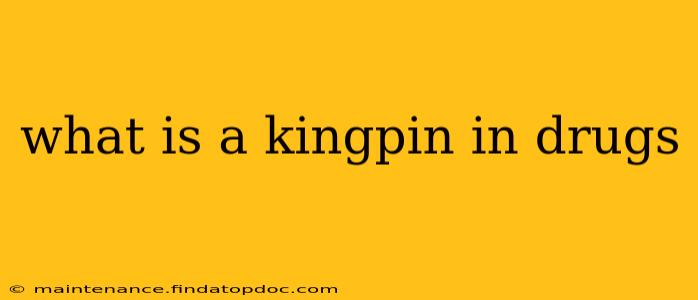What is a Kingpin in Drugs? Understanding the Role and Impact of Drug Traffickers
The term "kingpin" in the context of drugs refers to a high-ranking leader within a drug trafficking organization. They're not simply dealers; they are the masterminds behind large-scale drug operations, controlling vast networks of suppliers, distributors, and money launderers. Think of them as the CEOs of criminal enterprises, orchestrating complex logistical chains and wielding significant power and influence. Understanding their role requires delving into their multifaceted activities and far-reaching consequences.
What are the Responsibilities of a Drug Kingpin?
A kingpin's responsibilities extend far beyond simply selling drugs. They are responsible for:
- Strategic Planning & Operations: Kingpins oversee the entire drug trafficking operation, from sourcing raw materials (like coca leaves for cocaine) to distribution networks spanning continents. They strategize routes, manage personnel, and adapt to law enforcement pressure.
- Financial Management: The illicit drug trade generates billions of dollars annually. Kingpins manage these vast sums, often using sophisticated money laundering schemes to conceal the origins of the funds and invest in legitimate businesses to hide their wealth.
- Maintaining Control & Security: Kingpins must maintain control over their organization, often through violence, intimidation, and bribery. They employ layers of security to protect themselves and their operations from rival gangs and law enforcement.
- Recruitment & Training: Kingpins recruit and train personnel, ensuring loyalty and operational efficiency within their organization. This often involves indoctrination and the threat of violence.
- Negotiation & Partnerships: Kingpins often negotiate deals with other criminal organizations, establishing alliances and partnerships to facilitate drug trafficking. This involves complex negotiations and risk assessments.
How do Drug Kingpins Operate?
Drug trafficking operations are complex and sophisticated. Kingpins utilize various methods to evade law enforcement and maintain their control, including:
- Concealment & Smuggling: They use various methods to hide and transport drugs, from concealing them within shipments of legal goods to utilizing sophisticated smuggling routes.
- Bribery & Corruption: Kingpins often bribe officials to ensure the smooth operation of their network. This corruption can extend to law enforcement, customs officials, and even politicians.
- Violence & Intimidation: Violence is a common tool used to maintain control, suppress competition, and enforce discipline within the organization.
- Money Laundering: Kingpins employ various methods to launder their drug profits, making the money appear legitimate through investments in legitimate businesses or shell corporations.
What are the Consequences of Drug Kingpin Activities?
The activities of drug kingpins have devastating consequences, extending far beyond the immediate users:
- Fueling Violence & Crime: The drug trade is inherently violent, leading to gang wars, turf battles, and an increase in general crime rates.
- Public Health Crisis: Drug addiction has devastating consequences for individuals, families, and communities. The vast amounts of drugs distributed by kingpins fuel addiction and related health issues.
- Economic Instability: The vast sums of money generated by the drug trade distort local and global economies. Money laundering undermines financial institutions and undermines economic stability.
- Political Corruption: Bribery and corruption fueled by drug kingpins destabilize political systems and undermine the rule of law.
What are the challenges in combating drug kingpins?
Combating drug kingpins is a significant challenge for law enforcement agencies worldwide. Several factors contribute to this difficulty:
- Global Networks: Drug trafficking organizations operate across international borders, making investigations and prosecutions complex and challenging.
- Sophisticated Methods: They employ advanced methods of concealment, smuggling, and money laundering that are difficult to detect.
- Corruption: Corruption within government and law enforcement weakens the ability to effectively combat drug trafficking.
- Technological Advancements: Kingpins leverage technology to communicate and coordinate operations, making it difficult to track their activities.
In conclusion, drug kingpins are the masterminds behind vast, dangerous criminal organizations. Understanding their operations, their methods, and the devastating consequences of their activities is crucial in developing effective strategies to combat the global drug trade.
